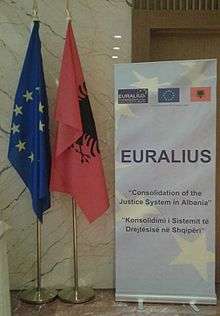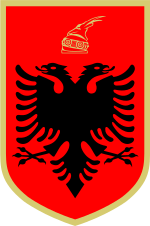EURALIUS
The "Consolidation of the Justice System in Albania" (EURALIUS) is an EU funded technical assistance project that seeks the strengthening of the Albanian Justice System.[1] The objective of EURALIUS is to strengthen the independence, transparency, efficiency, accountability and public trust in the Albanian justice system in line with the EU Acquis and best practices. EURALIUS is composed of long-term international experts from various EU Member States and of Albanian legal professionals who act as national experts, as well as support staff consisting of project assistants, translators, etc.
Consolidation of the Justice System in Albania | |
 | |
| Formation | 2005 |
|---|---|
| Type | EU technical assistance |
| Headquarters | Ministry of Justice, Tirana, Albania |
Official language | English Albanian |
| Website | www |
The transformation of the Albanian justice system toward EU standards is a condition and a process that aims to restore the people's confidence to the justice system, to the consolidation of the democracy and to the rule of law as required by the Stabilization and Association Agreement. The EU has devised specific instruments in order to facilitate the country accession and fulfillment of the conditions. Concerning the consolidation of the justice system in Albania EU funded the EURALIUS project.
Among the Albanian project partners and beneficiaries are the Ministry of Justice, the Judiciary (Courts), the High Council of Justice, the Prosecution Office, the Parliament of Albania, the Office for the Administration of the Judicial Budget, the School of Magistrates,[2] the National Chamber of Advocacy and the National Chamber of Notaries.
EURALIUS through the years

Since Albania submitted its application for European Union membership, it had to meet the membership criteria and key priorities set out in the Commission's Opinion. One of the major requirements for the EU membership is Functioning of the Judiciary. Therefore, the Commission Report on Albania (2015) has stated that: "Albania's judicial system is at an early stage of preparation. Besides the perception of the public toward the justice system in Albania is very low.
To consolidate the justice in Albania and to strength the transparency, efficiency and the public trust in the Albanian justice system, the EU funded the EURALIUS project. Initially the project was operating under the Albania CARDS 2002 programme in the form of the EURALIUS I mission. Then, during the period 2007-2010 the project was undertaken by the EURALIUS II mission. The project contractor for the first two missions was the Austrian Federal Ministry of Justice and managed by Center of Legal Competence (CLC). The main objective remained to development of a more independent, neutral, effective, proficient, transparent and modern justice system in Albania, therefore contributing to the restoring of people's confidence in their institutions.
Euralius III started on 15 September 2010 and was finalized on 15 June 2013. This mission was managed by International and Ibero-American Foundation for Administration and Public Policies (FIIAPP) and had similar objectives as the previous missions. Meanwhile, the currently operated mission is EURALIUS IV, while the EURALIUS V mission is in the pipeline stage.
EURALIUS IV
The previous mission of the Consolidation of the Justice System in Albania project was EURALIUS IV, which started in September 2014 and ended in March 2018. EURALIUS IV implementation was awarded to a consortium led by the German Deutsche Stiftung für Internationale Zusammenarbeit e.V. (IRZ), in cooperation with the Dutch Center for International Legal Cooperation (CILC) and the Austrian Agency for Economic Cooperation and Development (aed), which are all mandated bodies of respective Ministries of Justice. The main objective of the project was to assist the Albanian justice institutions to bring their enactment closer to the EU standards.
To achieve its objectives, the EURALIUS project applied a methodology for capacity building activities. For this purpose, the following steps were carried out these steps: problem analysis, gap assessment, strategy for gap bridging, legislative and institutional gap bridging. Additional activities included training, coaching and monitoring functioning in close cooperation with the key Albanian justice institutions and other international partners. The EURALIUS IV Team Leader was Dr. Agnes Bernhard.[3]
Except from supporting the work on judicial reform, the project was also charged with implementing a diverse array of objectives, arranged around the following components:[4]
Justice Reform and Organization of the Ministry
The main aim of this component was to assist the Albanian authorities to design and implement a justice system strategy. Its vision was to guarantee independence, transparency and efficiency. Moreover, it intended to enhance the professionalism and accountability of the services of the Ministry of Justice and relevant subordinate authorities.
High Council of Justice (HCJ) and High Court
The activities envisaged under this component aimed at supporting the High Council of Justice to ensure that decisions regarding the status and career of judges are based on objective, professional and transparent criteria that are in line with the EU standards. The support to the High Court aimed at enhancing its independence, efficiency and effectiveness, to ensure that the court can fulfil its constitutional task and to provide guidance to all other Albanian courts by unifying the judicial practice.
Criminal Justice and Prosecution Office
The activities envisaged under this component aimed at aligning the legislative framework in criminal matters including international cooperation to the EU and the Council of Europe standards, and supporting the reform of the criminal legal framework. It aimed at enhancing efficiency, independence and accountability of the Albanian prosecution service, including the alignment to the best European standards. Furthermore, the activities of this component include providing trainings on the new amendments of the CPC and comments for the e-commentary on CPC and Juvenile Code.
Judicial Administration and Efficiency
This component focused on improving transparency of court functioning and increasing the efficiency of the administrative staff in the justice system. It would also focus at improving case management, procedural codes and the use of technology at a country-wide level. The component aimed - by improving the IT - at reducing the length of trials, of courts backlog and improve service delivery to justice users.
Legal Professions
The main aim of the activities envisaged under this component is to strengthen the National Chamber of Advocacy, National Chamber of Notaries and the State Commission on Legal Aid, in particular through improving the legal framework, supporting disciplinary proceedings, codes of ethics and training programs for both lawyers and notaries, as well as through supporting civil society institutions providing legal aid.
Change Management
This component is focused on assisting the competent commission to prepare and monitor the set up of the new institutions established by the reform and to facilitate the change management in institutions with amended tasks. It aims at supporting the establishment of the new institutions and functions, from managerial and organisational perspective (e.g. support in design of the organisational structure, map of processes, financial management, HRM (human resources management), capacity building of management and staff).
High Judicial Inspectorate (HJI)
The main aim of this activity is assisting the HJI in building its capacities. It deals with the monitoring and implementation of the new laws and contributed to the drafting of sub legal acts and standard operating procedures for inspection and investigation in disciplinary misconducts and disciplinary proceedings. The assigned expert monitored and contributed to specialized trainings on disciplinary matters according to the new legislation.
Court Organisation and Management
This activity is mainly involved in assisting courts during the transition period before establishing HJC and HPC developing working-plan in the transition period. Moreover, it is focused on ensuring also court organisation and their role according to the new legislation with regard to the court administration issues. Additionally, it focusses on the practical implementation and provides input for the drafting of needed sub legal acts, regulations or manuals.
High Prosecutorial Council and Prosecution Offices
The main objective of this activity is assisting the establishment of the new High Prosecutorial Council and assisting in specialized capacity building of members and staff of the Council. Moreover, it involves monitoring of the implementation of the new laws, the transfer of tasks from the General Prosecutor to the Council, and the elaboration of sublegal acts and standard operating procedures. In addition, it assists elaborating new templates on criminal proceedings according to the new amendments of the CPC.
Judicial Training
The objective of this activity was mainly to assist the School of Magistrates in training the candidate magistrates, judges, prosecutors in particular on the legislation within the reform, as well as other training institutions for advocates and notaries. Additionally, it performed training for legal assistants, chancellors and other judicial civil servants, and assisted the bodies who have taken over new responsibilities for the training of judicial civil servants.
EURALIUS V
Following the comprehensive justice reform accompanied by EURALIUS IV, EURALIUS V focuses on supporting the justice institutions to consolidate the justice system. EURALIUS V concentrates its assistance on five main areas of intervention. EURALIUS V started in April 2018. The budget is EUR 7.5 Mill and the duration three years.
The project will be implemented by a Consortium composed of the German Foundation for International Legal Cooperation (IRZ) as Lead Partner. IRZ is mandated by the Federal Ministry of Justice and Consumer Protection. Junior partners are the Dutch Center for International Legal Cooperation (CILC), Austrian Agency for Economic Cooperation and Development (aed) and the Italian High Council for the Judiciary (CSM).
Justice Reform
EURALIUS has played an important role in the consolidation of the justice system in Albania, especially through the contribution of the EURALIUS IV mission in the setting up of the Justice Reform process. Throughout the reform, the international and national experts have assisted the process of drafting the Albanian legislation, amendments to the laws in the justice sector and supported the set up and strengthening of Albanian institutions. A pivotal part of the Justice Reform process was the approval of the constitutional amendments by the Albanian Assembly on 21 July 2016,[5] and of the legislative package of Organic Reform Laws,[6] with the most important being the Law on the Transitional Re-evaluation of Judges and Prosecutors of the Republic of Albania.[7]
References
- "Reforma Ne Drejtesi". Reforma Ne Drejtesi.
- "Shkolla e Magjistraturës e Republikës së Shqipërisë". www.magjistratura.edu.al.
- "Euralius - Team". euralius.eu.
- "Euralius - What we do". euralius.eu. Archived from the original on 2016-09-24. Retrieved 2016-09-08.
- http://www.euralius.eu/images/Justice-Reform/Amendamentet-kushtetuese-21-07-2016-AL.pdf%5B%5D
- admin (22 July 2016). "Kuvendi i Shqipërisë miratoi pesë projektligje të rëndësishme, pjesë e paketës së shtatë ligjeve prioritare për reformën në drejtësi".
- http://www.euralius.eu/images/Justice-Reform/Law-no-84-date-30-08-2016-on-the-Transition-re-evaluation-of-the-judges-and-prosecutors-of-the-Republic-of-Albania.pdf
